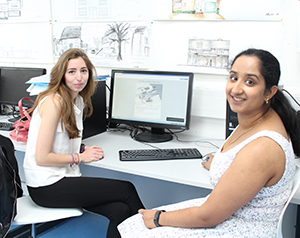Stage 5 – MArch
 After having had some experience delivering lectures and becoming a Teaching Assistant to First Years, as well as being on the panel for design crits, I wanted to develop my leadership and communication skills up a notch via academic peer mentoring and actually giving one-to-one feedback on students’ work, from design projects to essay writing and presentation skills. A lot of knowledge and guidance had been passed to me from tutors, but then I felt that it would be most rewarding to then help younger students in return and give them motivation that if I can get through a course as challenging as architecture, then others can too. Plus, mentoring has been a plus in terms of employability; during some of my recent job interviews for Part 2 roles, the mentoring has come up as a highlight that has impressed employers.
After having had some experience delivering lectures and becoming a Teaching Assistant to First Years, as well as being on the panel for design crits, I wanted to develop my leadership and communication skills up a notch via academic peer mentoring and actually giving one-to-one feedback on students’ work, from design projects to essay writing and presentation skills. A lot of knowledge and guidance had been passed to me from tutors, but then I felt that it would be most rewarding to then help younger students in return and give them motivation that if I can get through a course as challenging as architecture, then others can too. Plus, mentoring has been a plus in terms of employability; during some of my recent job interviews for Part 2 roles, the mentoring has come up as a highlight that has impressed employers.
I mentored both second and third year undergraduates, with occasional sessions being in pairs or groups. The common topic that came up was how to go about presenting CVs and portfolios for jobs, as well as the procedures for applying. Often, the students approached me with questions on design work: what would be the best way to visually represent work, which work communicates the project best and how to explain the development process effectively during a crit. Carlota Susino, who will be going into third year in September 2015, only started mentoring sessions with me about a month before her final second year design crit, but during that time I gave her guidance on how to pan out her tasks before the crit without leaving them to the last minute, and how to tie in her conceptual ideas to her final outcome. I always reminded Carlota and all my other mentees that I could only give suggestions, as do tutors too, but they are responsible for making their own decisions as long as they are able to fully justify their intentions, and architecture is a chance to be expressive and create a style that works for them. After all, employers want to see individuality, creativity and confidence in trying new techniques and ideas that students understand and are comfortable with.
Having said that, mentoring has helped me become critical in my own design work and giving everything a second glance over, before I am sure that I am ready to present my ideas to my own crit panel. I would say to anyone reading this, who is keen on the idea of peer-to-peer learning and teaching, academic peer mentoring is a fantastic scheme that the Kent School of Architecture has engaged with and it has its rewards to both mentors and mentees alike. Likewise, I recommend mentees to seek out an older, experienced student to help you along the way, as you’ll get a whole new perspective and a second opinion to keep you on track.
Mentee: Carlota Susino
I have only got good words to describe my mentor, Srimathi. In spite of starting with her almost at the end of the spring term she has helped me a lot, and I believe that because of her I have changed my attitude towards work. Most importantly she has taught me: don’t do things for others but for myself. And with that in mind, I think I have improved my presentation skills and my time management.
